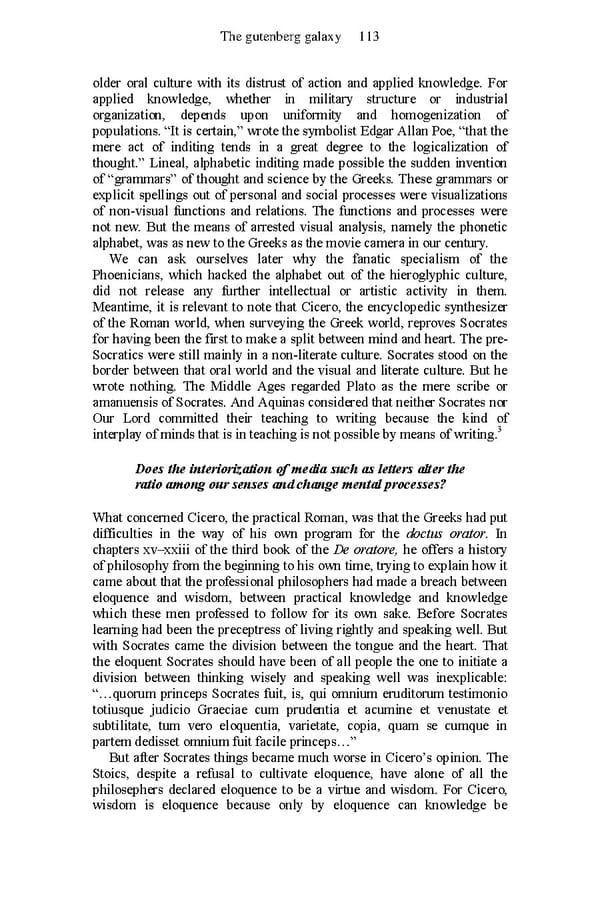The gutenberg galaxy 113 older oral culture with its distrust of action and applied knowledge. For applied knowledge, whether in military structure or industrial organization, depends upon uniformity and homogenization of populations. “It is certain,” wrote the symbolist Edgar Allan Poe, “that the mere act of inditing tends in a great degree to the logicalization of thought.” Lineal, alphabetic inditing made possible the sudden invention of “grammars” of thought and science by the Greeks. These grammars or explicit spellings out of personal and social processes were visualizations of non-visual functions and relations. The functions and processes were not new. But the means of arrested visual analysis, namely the phonetic alphabet, was as new to the Greeks as the movie camera in our century. We can ask ourselves later why the fanatic specialism of the Phoenicians, which hacked the alphabet out of the hieroglyphic culture, did not release any further intellectual or artistic activity in them. Meantime, it is relevant to note that Cicero, the encyclopedic synthesizer of the Roman world, when surveying the Greek world, reproves Socrates for having been the first to make a split between mind and heart. The pre- Socratics were still mainly in a non-literate culture. Socrates stood on the border between that oral world and the visual and literate culture. But he wrote nothing. The Middle Ages regarded Plato as the mere scribe or amanuensis of Socrates. And Aquinas considered that neither Socrates nor Our Lord committed their teaching to writing because the kind of 3 interplay of minds that is in teaching is not possible by means of writing. Does the interiorization of media such as letters alter the ratio among our senses and change mental processes? What concerned Cicero, the practical Roman, was that the Greeks had put difficulties in the way of his own program for the doctus orator. In chapters xv–xxiii of the third book of the De oratore, he offers a history of philosophy from the beginning to his own time, trying to explain how it came about that the professional philosophers had made a breach between eloquence and wisdom, between practical knowledge and knowledge which these men professed to follow for its own sake. Before Socrates learning had been the preceptress of living rightly and speaking well. But with Socrates came the division between the tongue and the heart. That the eloquent Socrates should have been of all people the one to initiate a division between thinking wisely and speaking well was inexplicable: “…quorum princeps Socrates fuit, is, qui omnium eruditorum testimonio totiusque judicio Graeciae cum prudentia et acumine et venustate et subtilitate, tum vero eloquentia, varietate, copia, quam se cumque in partem dedisset omnium fuit facile princeps…” But after Socrates things became much worse in Cicero’s opinion. The Stoics, despite a refusal to cultivate eloquence, have alone of all the philosephers declared eloquence to be a virtue and wisdom. For Cicero, wisdom is eloquence because only by eloquence can knowledge be
 Essential McLuhan Page 119 Page 121
Essential McLuhan Page 119 Page 121